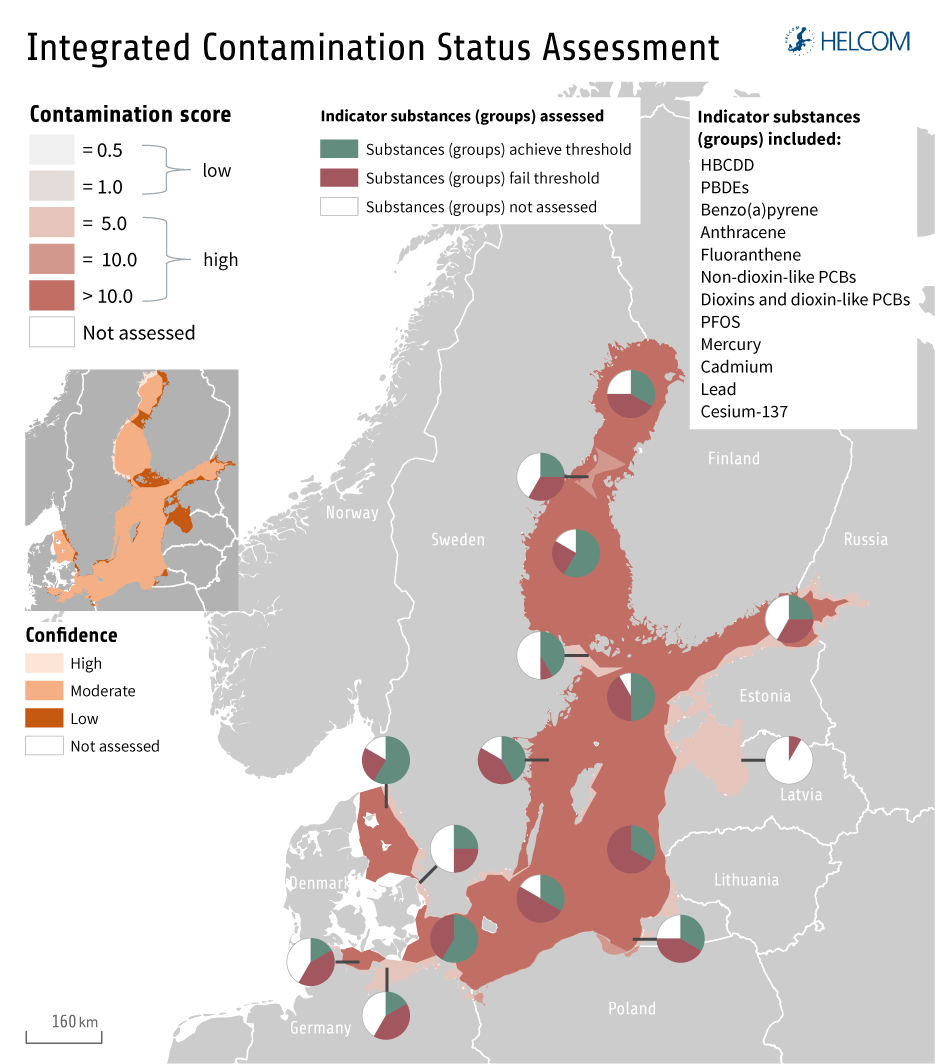Hazardous Substances
The main goal of the Working Area Hazardous Substances is to address the problem of pollution of the Baltic Sea,
associated with hazardous chemicals, marine litter, and waste.
The problem
Hazardous substances and marine litter, including micro plastics contamination, represents one of top-three main threats to the Baltic Sea environment and marine life. Many pollutants represent “old sins” such as industry emissions and previously used pesticides now banned. PCBs, heavy metals, dioxins and the more recent addition flame retardants are all still present in the environment and not least in fish and mammals.
Undesired occurrence and effects of human and veterinary pharmaceuticals in the environment is a global emerging concern, as recognized by UNEP. Pharmaceutical residues have been detected in environmental compartments of the Baltic Sea, but their environmental fate, possible accumulation and effects on biota are still poorly known. Gaps in existing legislation with regards to safe collection, recovery and disposal of unused and expired medicines leads to pharmaceuticals still ending up in the sea. According to the Status Report on pharmaceuticals in the BSR (2017), over half of unused human medicinal products in the EU is not collected due to low level of awareness and lacking collection schemes.
Also, around 70 % of the marine litter in the Baltic Sea is plastic. Plastic materials are of special concern due to their risks to the environment and slow degradation. The regional goal agreed in HELCOM is to reduce the amount of marine litter significantly by 2025 and prevent harm from litter in the coastal and marine environment.
The goal
The aim is to reduce the discharge, as well as the environmental and health risks related to, of hazardous substances and marine litter in the Baltic Sea region, by promoting principles of circular economy and sustainable management of chemicals. In this way, we will be contributing to the EU Circular Economy Action Plan, Chemicals Strategy and Zero Pollution Action Plan.
CCB works to achieve the Good Environmental Status of the Baltic Sea, and rivers in the catchment area in regards to minimization of impact of hazardous substances and litter. Our priorities in this working area are in line with the Baltic Sea Action Plan (updated in 2021): concentrations of hazardous substances are close to natural levels; all sea food is safe to eat; no harm to marine life from litter.
How is CCB working with this issue?
MATERIALS & MEDIA
WHAT CAN WE DO?
What can countries do together?
- Sharing information and national best practices, development and implementation of legislation and policies on chemicals and waste under EU and HELCOM framework.
What can each country do?
- Increase knowledge of the sources, threats and prevention measures regarding products containing chemicals of concern, micro plastics, especially personal care products;
- Improve pharmaceutical waste streams management and the collection system of obsolete pharmaceuticals at local, regional and national level;
- Introduce national measures to strictly regulate chemicals of concern, including endocrine-disrupting chemicals, and chemicals in products;
- Support national actions on reducing single-use plastic usage;
- Introduce zero-waste policies, and strategies in the country;
- Stop waste incineration.
What can you do?
- Practice zero waste/ waste prevention approach in your daily life
Avoid single-use plastic products, and packaging, where possible; - Avoid products containing microplastics;
- Join beach cleanups;
- Support NGOs in their work combating marine litter, single-use plastics, and chemicals of concern;
- Help fill data gaps on marine litter by using mobile apps;
- Educate yourself and your family and friends about chemicals in products issue, and how to minimize their influence.
Get in contact with the
CCB Working Area Leader on Hazardous Substances
If you have questions or want to collaborate
send an e-mail to:
secretariat [at] ccb.se
We continue to act, do you want to know more?
Click the button below to discover our other Working Areas.

